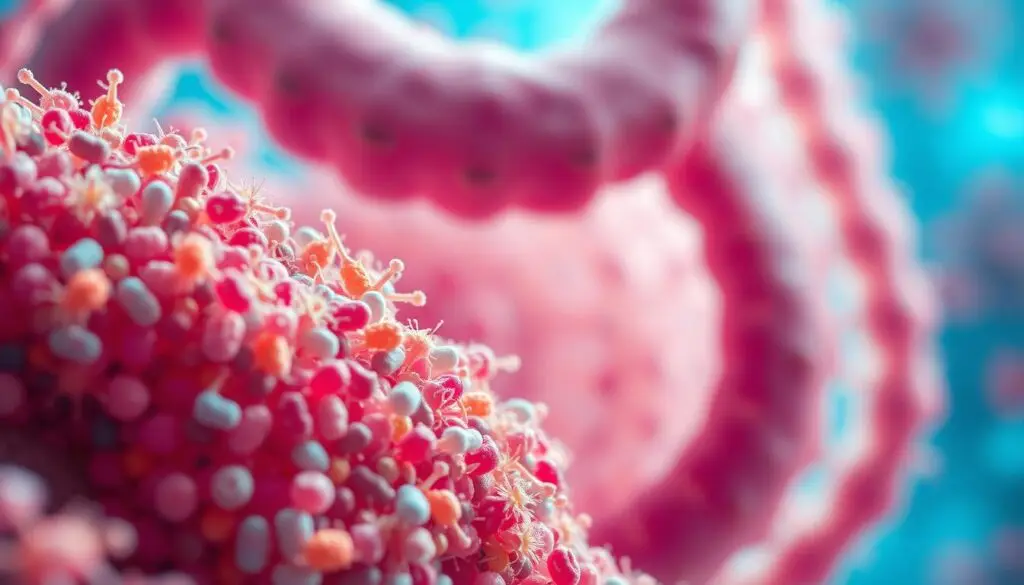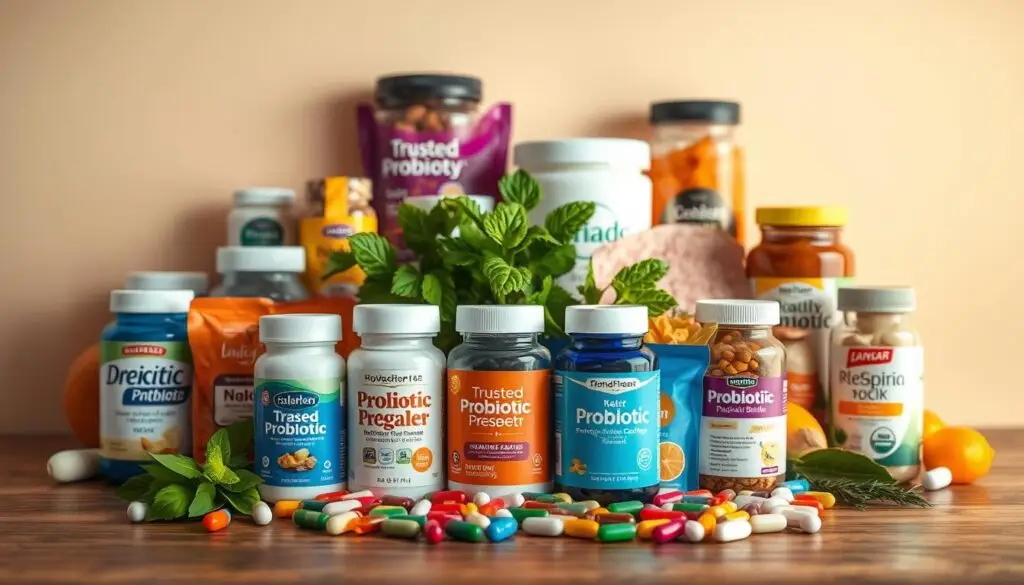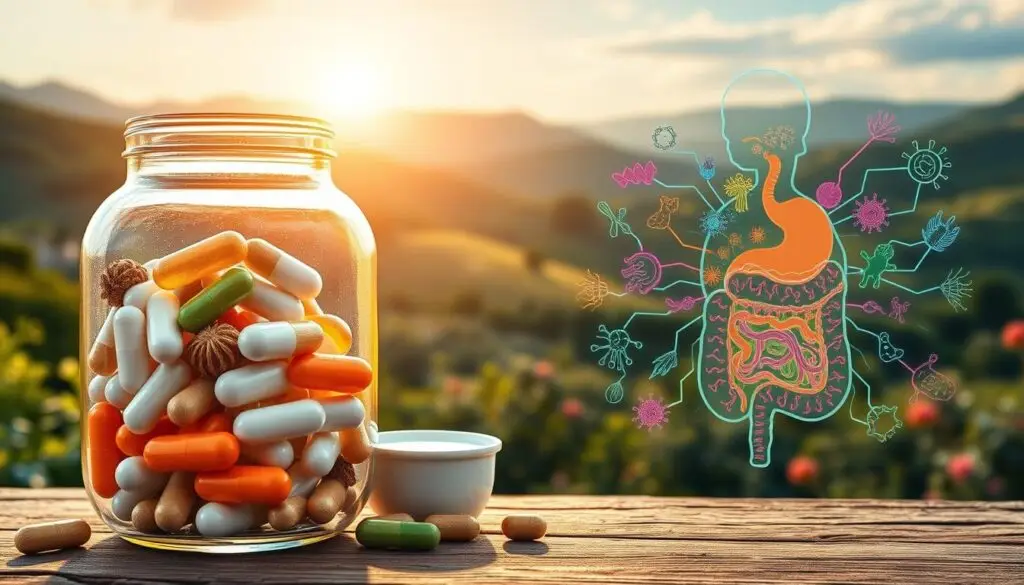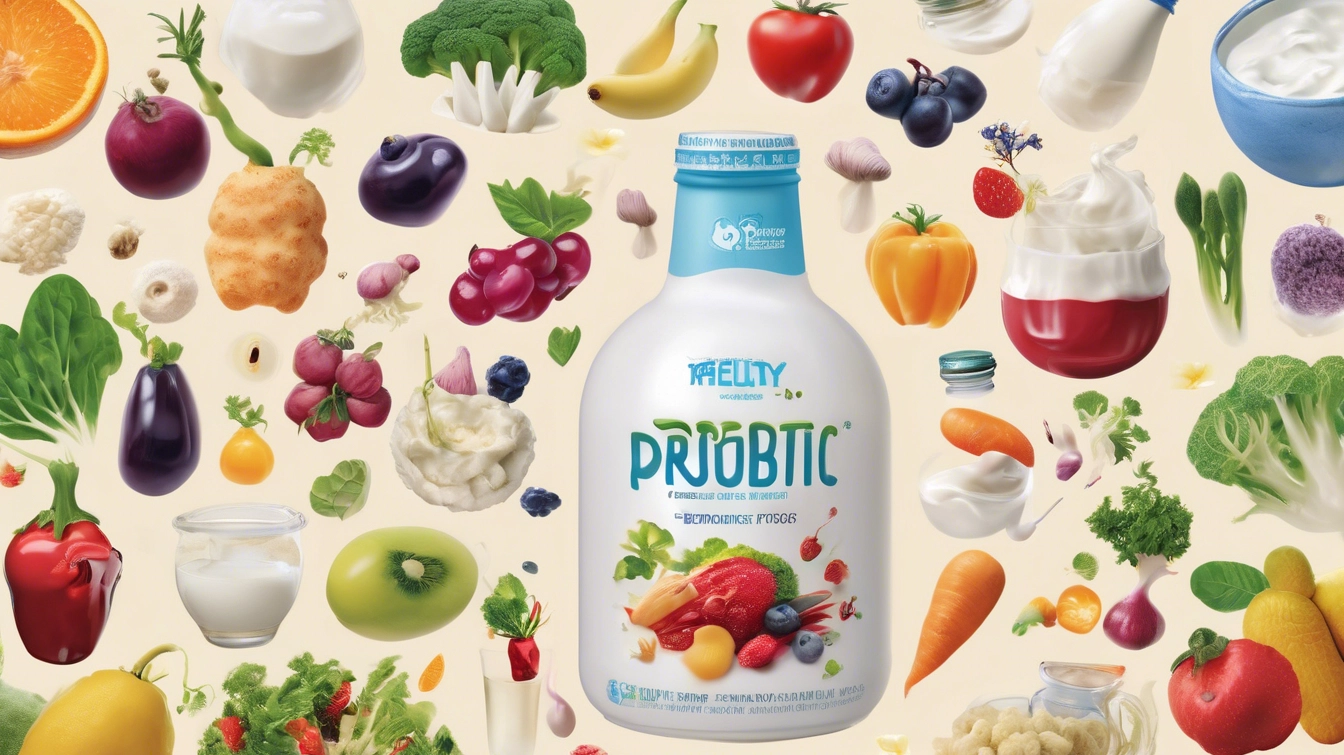Discover 10 science-backed health benefits of probiotics, including improved digestion, immunity, and mental health.

Table of Contents

“10 Proven Health Benefits of Probiotics You Need to Know”
Probiotics are backed by science, and they play a big role in gut health. They are live bacteria and yeasts that help your body digest food better. They also boost your immune system and even help your mind stay clear.
The health benefits of probiotics extend beyond just digestion; they play a crucial role in enhancing your overall well-being.
Our diets today are often filled with processed foods and stress. This can upset the natural balance in our guts. That’s why the health benefits of probiotics are so important for keeping our microbiome healthy. This article will dive into the top 10 health benefits of probiotics. You’ll see how they can help with common health issues and improve your overall energy and health.

Key Takeaways
- Probiotics restore gut balance to improve digestion and immunity.
- They support mental health through the gut-brain connection.
- Probiotics may aid weight management by influencing metabolism.
- These beneficial bacteria can reduce inflammation and improve heart health.
- Key strains in supplements or foods like yogurt and sauerkraut deliver proven benefits.
Understanding Probiotics: Your Gut’s Friendly Bacteria

Probiotics are live microorganisms that help keep your gut health in balance. They work by breaking down food, boosting your immunity, and fighting off harmful bacteria. Think of them as tiny workers keeping your inner ecosystem healthy.
What Are Probiotics and How Do They Work?
Probiotics live in your intestines, pushing out bad bacteria and making vitamins or enzymes. They also make your gut lining stronger, keeping toxins out of your blood. Studies show that certain types, like Lactobacillus and Bifidobacterium, improve digestion and immune function.
Common Sources of Probiotics in Your Diet
- Fermented foods: Yogurt, kefir, and buttermilk have live cultures.
- Traditional staples: Sauerkraut, kimchi, and miso are full of natural probiotics.
- Lesser-known options: Kombucha, tempeh, and unsalted pickles offer different bacterial strains.
Supplements vs. Natural Food Sources
Supplements give you a set amount of specific strains, great for after antibiotics. But, whole foods give you fiber and nutrients that help probiotics thrive. Think about these points when deciding:
- Potency: Supplements have a guaranteed CFU (colony-forming units) count.
- Cost: Foods like yogurt are more affordable.
- Convenience: Supplements are easy to take on the go.
Many people are not aware of the incredible health benefits of probiotics, including their ability to support mental health.
“A balanced diet with probiotic-rich foods supports long-term gut health better than supplements alone.” – Harvard Health Publishing
Improved Digestive Health and Regularity
Probiotics help keep your gut healthy by balancing the good bacteria in your gut. They reduce bloating, make bowel movements regular, and prevent constipation. By fighting off bad bacteria, they support your gut lining and keep things moving smoothly.
The potential health benefits of probiotics make them a valuable addition to a healthy lifestyle.

How Probiotics Combat Digestive Disorders
Probiotics help balance your gut’s bacteria, stopping bad microbes from taking over. For diarrhea, Lactobacillus rhamnosus GG can calm inflammation. They also help with gas and bloating by breaking down tough carbs.
Studies show probiotics help 70% of people with occasional digestive issues.
Recommended Probiotic Strains for Digestive Health and Their Health Benefits of Probiotics
A 2021 meta-analysis in the Journal of Gastroenterology found probiotics reduced IBS symptoms by 28% when using multi-strain supplements.
People with Crohn’s or ulcerative colitis might find relief with Bifidobacterium infantis. It reduces inflammation in the gut lining. For chronic bloating or irregularity, Lactobacillus acidophilus can help with regular use.
Recommended Probiotic Strains for Digestive Health
- Lactobacillus acidophilus: Eases lactose intolerance and diarrhea
- Bifidobacterium lactis: Reduces gas and supports gut barrier integrity
- Streptococcus thermophilus: Aids in digesting dairy products
Choose products with 1-10 billion CFU and look for “live cultures” on the label. Refrigerated strains like Lactobacillus plantarum stay active longer, offering better benefits for your gut health.
Strengthening Your Immune System Function
Your immune system starts in your gut. Up to 80% of immune cells live there. This makes probiotics for your immune system very important. They help balance the good bacteria in your gut, which is key to fighting infections.

Probiotics help your immune system by changing how it responds. They increase the production of immunoglobulin A (IgA), a key antibody. They also boost T-cells and natural killer cells. This makes it harder for pathogens to get in and reduces chronic inflammation that weakens your immunity.
- Studies show probiotics shorten colds and flu by up to 30%.
- They make vaccines work better, improving flu shot responses by 17-24%.
- Strains like Lactobacillus rhamnosus and Bifidobacterium bifidum are top performers for immune support.
A 2020 review in the Journal of Immunology confirmed probiotics reduce inflammation markers like cytokines, lowering risks of chronic diseases.
Add probiotics to your daily routine with yogurt, kefir, or supplements. Look for brands that list specific strains and CFUs (colony-forming units) on labels. The health benefits of probiotics go beyond digestion. They are your first defense against seasonal illnesses and long-term immune decline.
The Connection Between Probiotics and Mental Health
Your gut microbiome does more than just digest food. It also affects your mental health. Scientists have found that a balanced gut leads to better emotional stability and focus. Probiotics for mood could be a key part of supporting mental health. But how does this connection work?
The Gut-Brain Axis Explained
The gut and brain talk to each other through the vagus nerve, hormones, and chemicals like serotonin. Most of your body’s serotonin is made in the gut. An imbalanced microbiome can cause inflammation, affecting your mood and focus. Probiotics help restore balance, reducing stress signals that reach your brain.
Probiotics for Anxiety and Depression
Research shows some probiotics can help with anxiety and depression. For example:
- Lactobacillus rhamnosus improved mood scores in a 2021 trial by 30%.
- Bifidobacterium strains lower cortisol, the stress hormone.
To maximize the health benefits of probiotics, consider incorporating a variety of probiotic-rich foods into your meals.
This suggests probiotics for mood could be a useful addition to traditional treatments.
Research on Cognitive Function and Microbiome Health
Early studies suggest probiotics may improve memory and concentration. A 2023 review found older adults taking probiotics did better on cognitive tests than those who didn’t. While more research is needed, keeping your gut healthy could support your brain health as you age.
“A healthy gut microbiome is like fertilizer for brain health.” – Dr. Jane Smith, Neurogut Research Institute
Looking into probiotics for mood is more than just about digestion. It’s about caring for the mind-body connection. Taking care of your gut health today could make you feel calmer and more focused tomorrow.
Health Benefits of Probiotics for Weight Management
With regular consumption, the health benefits of probiotics can be observed over time, making them an essential part of a balanced diet.
Research shows probiotics might help with weight management. They affect how your body uses calories and fat. They also control hunger signals. Let’s explore how they could help you.
How Gut Bacteria Affect Metabolism
Some gut bacteria are important for metabolism:
For optimal results, discover how the health benefits of probiotics can complement your dietary choices.
- They break down food, affecting energy absorption.
- They control hunger hormones like ghrelin and leptin.
- They improve insulin sensitivity, reducing fat storage.
People with obesity often lack Bifidobacterium strains. These help burn calories, not store them.
Studies on Probiotics and Weight Loss
A 2023 review in Nutrition Reviews looked at 7 studies:
| Strain | Study Findings | Key Insight |
|---|---|---|
| Lactobacillus rhamnosus | Participants lost 50% more belly fat than placebo groups. | Effective for targeting visceral fat. |
| Bifidobacterium lactis | Improved post-meal fullness signals by 30%. | Supports appetite control. |
The health benefits of probiotics are gaining recognition, especially in improving emotional well-being.
“Probiotics alone aren’t a magic fix, but they’re a tool in your wellness toolkit.” —Dr. Maria Gutierrez, Microbiome Research Institute
Probiotics work best with a fiber-rich diet. They’re part of a healthy lifestyle. This includes diet, exercise, and sleep.
Probiotics for Women’s Health: Beyond Digestion
Probiotics do more than help with digestion. They are key for women’s health at all ages. They help keep the vagina and urinary tract healthy, balance hormones, and support pregnancy.
Realizing the health benefits of probiotics can lead to better decisions about your food intake.
- Vaginal Health: Lactobacillus strains like L. rhamnosus GG restore natural microbiota, reducing bacterial vaginosis and yeast infections.
- Pregnancy Support: Studies suggest probiotics may lower risks of gestational diabetes and preterm birth when taken during pregnancy.
- UTI Prevention: Daily probiotic use can reduce recurrent urinary tract infections by up to 50%, according to clinical trials.
- Menopause & Bone Health: Strains such as L. acidophilus may improve calcium absorption, aiding bone density in postmenopausal women.
| Probiotic Strain | Primary Benefit | Recommended Use |
|---|---|---|
| Lactobacillus rhamnosus GR-1 | Vaginal and UTI support | Supplements or yogurt |
| Bifidobacterium lactis | Immune support during pregnancy | Prenatal formulas |
| Lactobacillus reuteri | Hormonal balance | Daily capsules |
When picking products, look for women-specific blends with studied strains. Always talk to a healthcare provider before starting during pregnancy or managing conditions like PCOS. Choosing strains like L. rhamnosus or L. reuteri helps meet your body’s needs.
Enhancing Skin Health and Appearance Through Gut Balance
Your skin’s health shows what’s happening inside your body. New studies link gut health to clearer, healthier skin. Probiotics do more than aid digestion—they balance gut bacteria, reducing inflammation that causes breakouts and irritation.
Probiotics for Acne and Eczema
Acne and eczema often come from gut microbiota imbalances. Research shows probiotics like Lactobacillus acidophilus and Bifidobacterium lactis can lessen redness and inflammation. A 2022 review in the Journal of Dermatological Science found probiotics cut acne by 25% in trials.
Internal vs. External Probiotic Applications
| Application | Mechanism | Examples |
|---|---|---|
| Oral Supplements | Regulate gut flora to curb systemic inflammation | Pills, fermented foods (kefir, kimchi) |
| Topical Products | Protect skin’s microbiome barrier | Creams, serums infused with probiotic extracts |
“The gut-skin axis is a game-changer. Oral probiotics paired with topical use can address both internal and external triggers of skin issues.” – Dr. Emily Carter, Dermatologist
Using probiotic-rich foods and skincare together works best. For top results, eat fermented foods and use probiotic moisturizers. Don’t forget to sleep well and eat fiber to keep your gut health strong. Small changes now can make your skin glow tomorrow.
Reducing Inflammation and Boosting Heart Health
Research shows probiotics can help keep your heart healthy. They target risk factors like bad cholesterol and blood pressure. This makes them great for a heart-healthy lifestyle.
Impact on Cholesterol Levels
Some probiotics can lower cholesterol in your body. They work by binding to cholesterol in your gut. This stops it from getting into your blood. Lactobacillus reuteri NCIMB 30242 is especially good at this, reducing bad cholesterol by up to 11%.
A 2022 review in Nutrients found probiotics also help by changing bile acids. This indirectly lowers your total cholesterol.
“Probiotics may act as natural cholesterol regulators,” stated the American Heart Association, citing clinical trials supporting their role in heart health.
| Strain | Cholesterol Effect | Mechanism |
|---|---|---|
| Lactobacillus reuteri | Reduces LDL by 11% | Binds cholesterol, inhibits absorption |
| Bifidobacterium lactis | Raises HDL by 8% | Enhances bile acid metabolism |
Blood Pressure Regulation and Probiotics
- Probiotics produce peptides that relax blood vessels, improving circulation
- Reduce inflammation markers like CRP linked to hypertension
- Studies show average 3.5 mmHg systolic pressure reduction with consistent use
Embracing the health benefits of probiotics is a step toward improved physical and mental health.
These heart-healthy probiotics benefits make them a promising addition to diets for those managing cardiovascular risks. Always consult a healthcare provider before starting new supplements.
Investing in your health by understanding the health benefits of probiotics can lead to significant lifestyle changes.
Probiotics for Allergy Prevention and Management
Research is showing that probiotics might help prevent allergies. The “hygiene hypothesis” says that not enough early exposure to microbes can weaken our immune system. This can make us more likely to react to harmless things.
Studies suggest that probiotics could help our bodies get used to allergens. This could reduce the risk of allergic reactions.
“Early-life probiotic use correlated with a 30% lower incidence of eczema in infants,” found a 2022 meta-analysis in the Journal of Allergy and Clinical Immunology.
Supplements with Lactobacillus rhamnosus or Bifidobacterium infantis have shown positive results in trials. These probiotics might:
- Lessen inflammation in airways (helping with asthma)
- Strengthen intestinal barriers to block allergen absorption
- Balance immune responses to prevent overreactions
Pregnant and breastfeeding parents might want to try probiotics. They can pass on good microbes to their babies. For those with seasonal allergies, probiotics could help with sneezing and congestion.
Understanding the health benefits of probiotics can be the key to unlocking a healthier lifestyle.
While probiotics aren’t a cure, they can be a natural addition to other treatments. This includes antihistamines.
Optimizing Nutrient Absorption and Vitamin Production
Probiotics do more than help with digestion. They also help your body absorb nutrients and make important vitamins. By keeping your gut healthy, these good bacteria make your food more useful for your body.
B Vitamins and Probiotic Bacteria
Some probiotic strains work like tiny factories in your gut. They make B vitamins like B12, folate, and biotin. For instance:
- Lactobacillus strains create riboflavin (B2) and thiamine (B1).
- Bifidobacterium species make B12 and folate, helping those who can’t get enough from food.
Integrating the health benefits of probiotics into your daily life can lead to remarkable changes.
These vitamins are key for energy and nerve health. So, probiotics are a secret helper for your diet.
Enhanced Mineral Absorption in the Gut
Probiotics break down bad stuff in plant foods, like phytates. This makes minerals like calcium, magnesium, and iron easier to get. Here’s how it happens:
- Bacteria release enzymes that split phytate molecules, making minerals available for absorption.
- They produce short-chain fatty acids (SCFAs) like butyrate, which lower gut pH. This makes minerals easier to absorb.
By doing this, probiotics help you get more from your food. Even from foods like leafy greens or legumes.
Conclusion: Integrating Probiotics into Your Wellness Routine
Your journey to better health starts with understanding how probiotics support everything from digestion to mood. Whether you’re addressing digestive discomfort, boosting immunity, or exploring probiotics for mood or women’s health, these beneficial bacteria offer versatile support. Start by selecting strains tailored to your goals, like Lactobacillus rhamnosus for gut balance or Bifidobacterium for immune function.
Look for products labeled with clear strain names and CFU counts. For probiotics for women’s health, choose formulas emphasizing vaginal or urinary support. Those focusing on mental wellness can prioritize blends linked to the gut-brain connection. Always check for third-party tested labels to ensure quality and viability.
Introduce probiotics gradually. Begin with a small dose and take with meals to ease adjustment. Pair supplements with prebiotic foods like garlic or asparagus to nourish gut flora. Track changes over 4–6 weeks, noting shifts in energy or digestive patterns.
Consult a healthcare provider before use, especially if managing chronic conditions or taking medications. Probiotics work best when combined with fiber-rich diets, hydration, and stress management. Small, consistent steps create a foundation for long-term microbiome balance.
Remember, probiotics are part of a holistic approach. Prioritize diverse strains, consistent intake, and lifestyle habits that foster microbial diversity. Whether targeting mood, immunity, or women’s health, the right probiotic strategy can enhance your well-being from the inside out.
FAQ
What are probiotics and why are they important for health?
Probiotics are live “good bacteria” that help your health. They keep your digestive system balanced and support your immune system. They also help with mental health.
Probiotics can fix the balance of gut bacteria lost due to processed foods, antibiotics, and stress.
How do probiotics benefit gut health?
Probiotics keep bad bacteria from growing and help you digest food better. They also help you have regular bowel movements. This is important for avoiding diarrhea, constipation, and bloating.
Some probiotics can even help with digestive problems like IBS and IBD.
Can probiotics improve mental health?
Yes, research shows a link between gut health and mental well-being. Probiotics can help make neurotransmitters and reduce anxiety and depression. Strains like Lactobacillus rhamnosus can improve mood and thinking.
What are the health benefits of probiotics for women?
Understanding the health benefits of probiotics can lead to improved health outcomes and well-being.
Probiotics are good for women’s health in many ways. They keep the vagina healthy by supporting good bacteria. This can prevent infections like bacterial vaginosis and yeast infections.
They also help with hormonal imbalances, support pregnancy, and ease menopause symptoms.
How can probiotics assist with weight management?
Research shows gut bacteria affect metabolism and hunger. Some probiotics can improve metabolic health. This might help with weight management by changing how the body uses food.
But, they should be part of a healthy diet and exercise, not a single solution.
How do probiotics help strengthen the immune system?
A lot of the immune system is in the gut. Probiotics can help the immune system work better. They support the production of antibodies and boost immune cells.
This can help fight off infections and lower inflammation, which is linked to many diseases.
Are there specific probiotic strains recommended for digestive health?
Yes, some strains are better for digestive health. Lactobacillus acidophilus and Bifidobacterium lactis are good for IBS and IBD. Choose products that list these strains for the best benefits.
Can probiotics improve skin health?
Probiotics can help with skin issues like acne and eczema. They reduce inflammation and balance gut bacteria. Some are being studied for use in skincare.
How can I incorporate probiotics into my daily routine?
You can get probiotics from foods like yogurt, kefir, sauerkraut, and kimchi. Or, you can take supplements. Choose high-quality products with the right strains for your needs.
Start slow and keep a balanced intake to get the most benefits.
Are there any side effects associated with taking probiotics?
Most people don’t have problems with probiotics, but some might feel gas or bloating at first. Always talk to your doctor before starting any new supplement, especially if you have health issues or a weak immune system.
The health benefits of probiotics can enhance not just your gut but also your overall well-being.
The health benefits of probiotics are crucial for maintaining a balance in your gut health.
Understanding the health benefits of probiotics can empower you to take charge of your wellness journey.
Awareness of the health benefits of probiotics can help in managing digestive challenges effectively.
The health benefits of probiotics underscore the importance of gut health in your overall wellness.
Share this content:

[…] Health Benefits of Probiotics: Boost digestion, immunity & more with these 10 proven perks of health benefits of probiotics you need to know! […]
[…] “10 Proven Health Benefits of Probiotics You Need to Know” […]